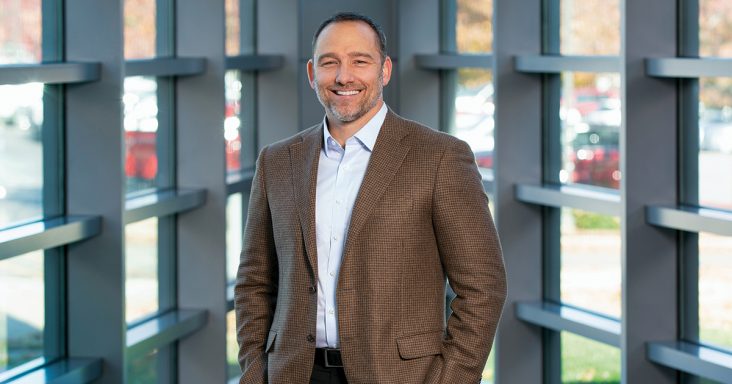Tyson Foods turns to ‘informed outsider’ as CEO
by November 2, 2020 11:57 am 3,924 views

Dean Banks, 47, assumed the role of Tyson Foods CEO on Oct. 3.
After serving about one year as company president and three years as a director, Dean Banks officially started as Tyson Foods CEO on Oct. 3. While he had no prior experience in food processing before his 2017 board appointment, Banks does have technology, health and leadership expertise and has already started to put his stamp on the company in those key areas.
As CEO, Banks earns a base salary of $1.2 million, plus millions more in performance-based compensation in cash and stock options and the use of the company aircraft for personal reasons. His background includes service in the U.S. Marine Corps., an MBA from Harvard University, a director role with Cleveland Clinic Innovations, and managing partner of SEED Ventures, a group that incubates and invests in early-stage healthcare technologies. More recently, he was project lead for X, a Google company.
Banks, 47, is the third CEO for Tyson Foods since Donnie Smith retired in November 2016. It also marks the second time in four years the company has turned to outside expertise for its CEO. Tom Hayes followed a similar accelerated path to CEO after the company promoted him to the president under Smith, a short time after joining the company following the Hillshire Brands acquisition in 2014. Hayes served less than two years as CEO and resigned abruptly in September 2018 for personal reasons. He has since assumed the CEO position at Ocean Spray.
Noel White, 62, took over as CEO in September 2019 and announced his retirement earlier this year. White spent more than 35 years in the business running all Tyson’s major divisions during his tenure. Tyson Foods created a vice chairman role for White to keep him close to the company for the next three years. White will earn more than $1.25 million for his vice chairman role this first year, gradually declining to $1 million by 2023.
Alan Ellstrand, a corporate governance expert at the University of Arkansas, applauds Tyson’s efforts to keep White in a leadership role where he can serve as a valuable mentor for Banks over the next three years. He said this looks to be a well-thought-out succession plan.
He said Banks could add valuable expertise in technology across the business from artificial intelligence to predict demand to robotics to automate production roles. And concerning Banks’ health acumen, Ellstrand said there are plenty of opportunities for Tyson to explore the impact on health initiatives.

It’s not that unusual for a board member to become a top executive at the company it serves, Ellstrand said. He cited a study that found between 2005 and 2016, 58 non-executive board members were elevated to CEO at large companies. He said about half of those moves occurred when the CEO abruptly resigned, which was not the case at Tyson Foods.
He said choosing a board member as CEO is elevating an “informed outsider.” In the case of Banks, Ellstrand said his three years of board service before his one year as president give him inside knowledge, but he can also lend his outside perspective in the critical areas of technology and health.
“Tyson has moved away from the direct family running day-to-day operations in the past several years, and Banks is a true hybrid [who] could serve the company well,” he said.
CHALLENGES AWAIT
Banks took the helm amid volatile times in the industry. He oversees 42 Tyson facilities operating in connection with the company’s more than $40 billion meat protein business and over 141,000 employees, hundreds for contract growers, farmers and supply chain partnerships.
The company has just come off a volatile third quarter with earnings down 22% from the prior year and down 5% on an adjusted basis. In August, White said the company absorbed higher-than-normal operating costs related to COVID-19. He also said the fourth quarter was off to a solid start, though the pandemic continues to be disruptive.
Earnings have been lighter than usual, and Tyson Foods shares (NYSE: TSN) have been under pressure for some time. Through Oct. 15, Tyson’s share values are down 35% since its mid-January high at $94. Tyson did not provide guidance, given the magnitude of uncertainties. Wall Street expects Tyson’s annual earnings to be down 8% from a year ago, with revenue of $42.79 billion, up 0.9%. Eleven of 16 analysts who cover Tyson Foods give the stock a buy or strong buy rating. The other five are neutral, saying the turnaround won’t be quick.
Analysts have told the Northwest Arkansas Business Journal that running Tyson Foods is one of the most challenging jobs in the country, given its scale and widely diverse business units, as well as the plethora of “wild cards” the company faces each year.
Tyson has been working on automating more business practices. The company has invested more than $500 million in technology over the past three years, including a new manufacturing automation center in downtown Springdale. Banks told the media earlier this year he felt his technology background could help Tyson Foods update its operations.
LEGAL WRANGLING & ANGST
In addition to running a complicated business, Banks and Tyson Foods have several large pending lawsuits domestically and abroad. There is an environmental case over a water pollution incident in Alabama that killed thousands of fish in 2019. The lawsuit with competitor Marfrig over the purchase of Keystone Foods assets has gone to arbitration in recent weeks and continues.
One of Tyson Foods’ poultry complexes in Jiangsu Province, China, is being sued. The company said the Environmental Protections Bureau estimates a debt of 2.25 million yuan, or $316,000, in penalties.
Additionally, Tyson Foods was sued this year by several of the families of employees who died from COVID-19 complications. Multiple cases continue. Tyson has maintained it never put workers’ safety at risk, going above and beyond health officials’ and the Center for Disease Control and Prevention’s guidelines. A case filed in Idaho called into question a double-standard as plant workers in mid-March were incentivized to remain in the workplace while white-collar employees at Tyson Foods’ home office were told to work from home.
In east Texas, a lawsuit filed said workers were forced to continue working despite Gov. Greg Abbott’s stay-at-home orders. Tyson asked to have the case moved to federal court.
There are also two federal lawsuits by the U.S. Department of Justice against Tyson concerning price-fixing of chicken and a second lawsuit with similar beef business claims. Tyson received a grant of leniency in the poultry lawsuit, given its self-reporting of critical information in the case. In July, Tyson was one of four defendants in a class-action lawsuit filed in federal court in Minneapolis. In that case, Tyson and its beef competitors are being accused of collaborating and conspiring to limit the meat supply, sending prices up 59% between 2015 and 2018. Tyson has not yet commented to the media on this lawsuit.
Tyson Foods outlines the most significant risks — including the pending litigation — in its annual report filed with the U.S. Securities and Exchange Commission. Despite Tyson’s focus on sustainability in recent years and an occasional accolade, the meat titan has a host of environmental and farm advocate groups that continually oppose its operations.
